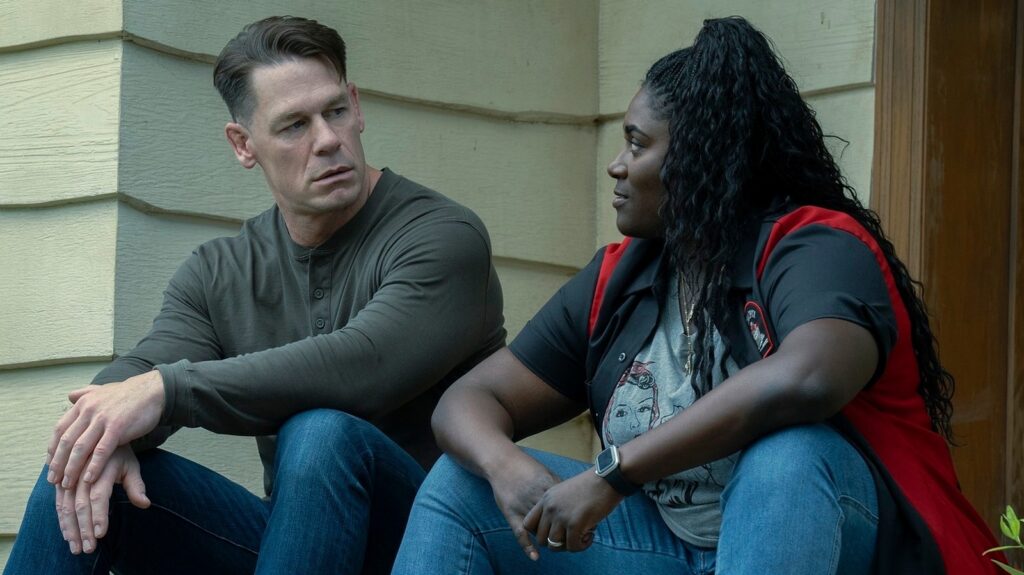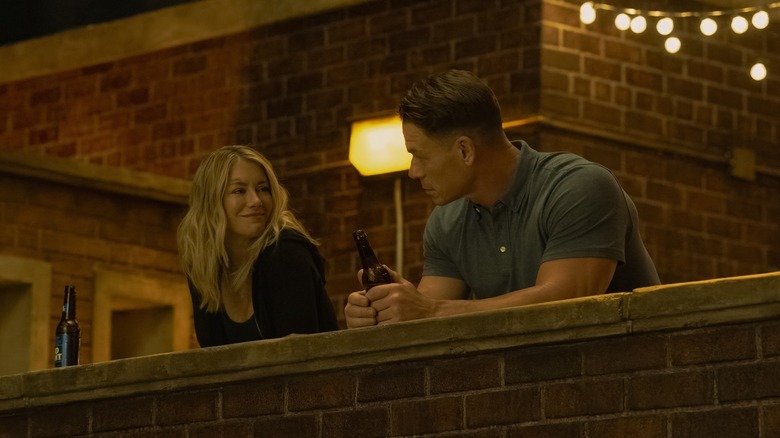RATING : 8 / 10
- Strong character-driven storytelling
- Fun sense of humor
- There are limits to originality in multiverse stories
“Peacemaker” is a show that shouldn’t have worked but did. When hearing that the most loathsome member of James Gunn’s 2021 “The Suicide Squad” was going to get his own series, the immediate question to ask was, “Why?” I’m sure John Cena’s such a nice talented guy that anyone would want to make excuses to keep working for him, and he was funny in the role of the jingoistic and decidedly un-peaceful Chris Smith, aka Peacemaker, but it didn’t seem obvious how that character could carry a whole series.
“Peacemaker” Season 1, while somewhat rough around the edges (you could tell Gunn wrote the whole eight-episode season in just two months), succeeded in making people actually want to see more of its protagonist. Never forgetting to make fun of Peacemaker for being a loser who sucks, the show proved thoughtful and sensitive in examining how he became a loser who sucks — it’s nurture, not nature — while also offering a convincing arc of how such a sucky loser could seek to improve himself and at least partially succeed. Character was the show’s strong suit, with Peacemaker’s tragic past and personal evolution sticking in the memory far more than the actual saving-the-world plot (something with alien Butterflies? It’s been three years, no shame in needing a recap before “Peacemaker” Season 2).
One full DC continuity reboot later, the second season of “Peacemaker” builds on the first season’s strengths with a more focused story driven by its characters’ conflicts and desires. Warner Bros. Discovery has only provided the first give out of the season’s eight episodes for review, so I can’t assess how it all comes together in the end. Based on what I’ve watched, however, I can tell you this is just what fans of the first season have been looking forward to: an irreverent, over-the-top, adults-only good time with enough heart beneath the crudity to give it a real impact.
Peacemaker: Into the Peace-iverse
The first scene of “Peacemaker” Season 2, a “previously on the DCU” montage, gets the nerd pedantry out of the way. For anyone wondering how a show that started in the now-defunct DC Extended Universe is continuing into the new DC Universe, the answer is simple: everything that happened in Season 1 is still canon in Season 2 except for the scenes mentioning or featuring the Justice League, which have been replaced in this montage with equivalent scenes involving the Justice Gang (the Aquaman fish sex jokes have been replaced with a different hero and a different fetish). No convoluted multiverse explanations needed.
“Peacemaker” Season 2 is, in fact, a multiverse story, but one with a different motivation and (from what’s been shown so far) zero interest in using the plot device for continuity management the way superhero stories often do. Multiverse stories typically come in three flavors: A) “What if you made different life choices and could see those different outcomes?,” B) “What if a portal fantasy adventure had a science-y sounding explanation?,” and C) “What if there were multiple Spider-Men?” That “Peacemaker” sticks to archetype A doesn’t make it super original — all flavors of multiverse have been overdone in the past few years — but it does have some novelty in the world of superhero media, which tends towards archetype C for obvious reasons.
The specifics of what make the parallel world Peacemaker wanders in and out of from his Quantum Unfolding Storage Area “better” than his home world are embargoed as spoilers. To speak more generally, the thematic purpose of this multiverse story is to delve into the series’ greater theme of regrets and consequences. Peacemaker may have saved the world and become less of a jerk, but his past actions continue to haunt him, and the consequences of those actions put him in danger. In particular, Rick Flag Sr. (Frank Grillo) will never forgive Peacemaker for killing his son, Rick Flag Jr. (Joel Kinnaman), and is using all his power in A.R.G.U.S. to get justice and/or revenge. In this situation, why wouldn’t Chris want to escape to a different reality? I suspect that escapism will have its own consequences — some of Leota Adebayo’s (Danielle Brooks) questions about the nature of this alternate reality have me wondering if James Gunn might be playing with the themes of a classic story from different DC hero.
James Gunn’s naughty humor is on full display
As he did in Season 1, James Gunn wrote every single episode of “Peacemaker” Season 2 himself. This season, the DC Studios creative head honcho and “Superman” director is only directing three episodes (only one of which screened for critics) as opposed to five, but his fingerprints are all over the project. One Gunn staple that shines through: his superhero projects are consistently the best at handling CG animals. Eagly might not be quite as adorable as Krypto, but the bird gets a lot of love this season, including a delightful subplot where he takes on a culturally appropriative hunter.
Another Gunn trademark? Horniness. It was evident even in the family-friendly “Superman,” and the TV-MA “Peacemaker” lets Gunn go back to his exploitation film roots. An orgy sequence in the season premiere must have made HBO’s anonymous “pervert exec” the happiest he’s been in some time. Peacemaker’s fluid sexuality — he takes being told he “sucks d***” as a compliment — remains refreshing, while his romantic side and feelings for Emilia Harcourt (Jennifer Holland) play a bigger role in the story. Fellow costumed crimefighter Adrian Chase, aka Vigilante (Freddie Stroma), has his own perspective on sex that leaves everyone else baffled — though that’s the least of the ways Vigilante acts baffling.
Gunn has been hyping up “Peacemaker” Season 2 as being essential to setting up the broader story for the DCU, but aside from the Justice Gang cameos in the first episode, these five episodes feel very self-contained. If anything, the most expansive DCU world-building being done here is establishing this universe’s DSM (“toxic masculinity” — for women — and “bird-blindness” are official medical diagnoses here). If the last three episodes do go heavier on serious lore, I hope it will be handled well without detracting from the humor and more contained focus of the central character arcs. This is a show where every episode’s post-credits scene is the silliest extended joke imaginable — I don’t know how much franchise-building importance a show like this can actually handle, but then again, pulling off something that sounds like a bad idea is its whole M.O.
“Peacemaker” Season 2 premieres August 21 on HBO Max.


